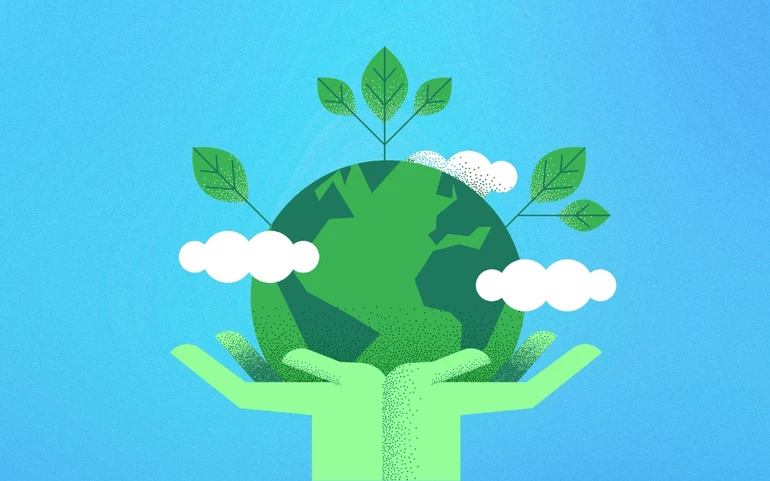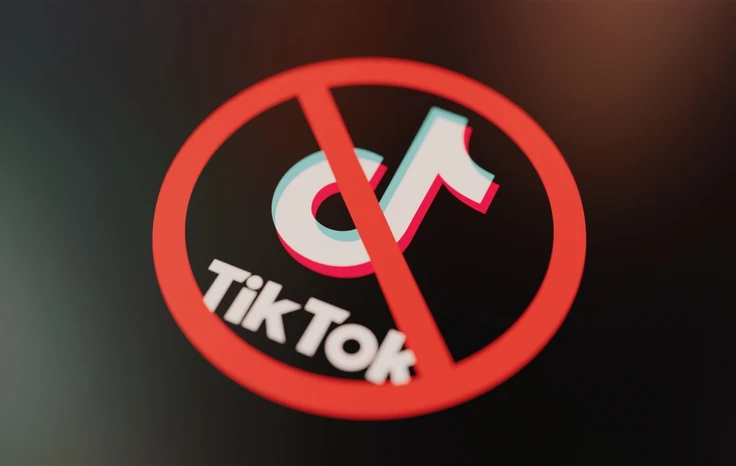Modern Healthcare Diagnostic Testing & Monitoring
Earth Day 2024: Why Sustainable Tech Has Never Been So Important

The Earth is estimated to be around 4.5 billion years old. For most of this existence, the planet we call home has moved through various cycles and ages and come out the other side. However, the rapid development of the human race is putting more pressure on the Earth than it has ever seen before.
As climate change opens up the very real risk that our planet may not survive as long as we would like it to, it’s important to acknowledge that all businesses have a role to play in the global efforts to combat this problem.
That’s why Earth Day has become such an important initiative to remind people and businesses around the world why we should care for our planet and invest in a sustainable future.
What is Earth Day?
Earth Day is an annual event celebrated on April 22nd to show support for environmental protection. It started in 1970 and has grown into a large global movement with events coordinated in over 193 countries.
Earth Day is more than just a day on the calendar. It's a chance for people around the world to come together and show their support for protecting our planet to raise awareness about environmental issues and inspire action towards a more sustainable future.
The first Earth Day in 1970 led to the creation of the Environmental Protection Agency in the US and the passage of landmark environmental law. It continues to be a catalyst for environmental policy changes worldwide.
This year, the theme for Earth Day is "Planet vs. Plastics”, highlighting the issue of plastic pollution and advocating for solutions to reduce plastic use. By focusing on plastic pollution, Earth Day 2024 aims to inspire a global movement towards a future where plastic pollution is significantly reduced, if not eliminated entirely.
Earth Day in Tech
Earth Day holds a surprising amount of importance for tech companies, and it's not just about good PR. Participating in Earth Day allows businesses to showcase their commitment to environmental responsibility, potentially attracting and retaining customers who value similar things.
Earth Day also serves as a launchpad for businesses to highlight their sustainability efforts and initiatives. This could involve showcasing eco-friendly practices, announcing new green goals, or launching educational campaigns for employees and customers. It's a chance to demonstrate a commitment to environmental responsibility, which is increasingly important for attracting eco-conscious consumers.
“It's not just about being a responsible business,” states Kate Lincoln, Head of Group Governance at Node4, “but it is the fact that every business transaction ultimately has an environmental impact. Increasingly, clients and employees have an expectation that suppliers and employers have a commitment to sustainability, and this is likely to impact the loyalty of all parties, particularly when it resonates with their priorities and values.

“The good news is that we are moving in the right direction and the tech industry, in particular, has made substantial strides. With the rise in artificial intelligence and machine learning, 2024 is poised to see even greater drive for tech-driven sustainability.
“However, despite the fact that Sustainable Technology has moved from #10 on the Gartner Top 10 Strategic Technology Trends for 2023 to #3 on the 2024 list, many execs do not recognise the significance or prioritise it at the board level. One of the key practices we advocate for is holding regular management reviews. By simply sitting down and reviewing emissions, we can get everybody invested in the cause and drive significant improvements.”
Does being green really matter?
Being environmentally friendly doesn’t only benefit the planet, it makes good business sense too. Saskia van Gendt, Chief Sustainability Officer at Blue Yonder, argues that “Sustainable practices can not only improve a business's brand recognition and reputation, but they can have a positive financial impact too.
Read: Top 10 GreenTech Companies for 2024
“As consumers become more aware of ethical and sustainable production, Blue Yonder’s recent Consumer Sustainability Survey found that 40% of respondents would be willing to pay more for a sustainable product. Therefore, it’s more important than ever for companies to have full visibility into their supply chain operations so they can back up their sustainability claims with tangible data to strengthen consumer trust.”
Keeping carbon under control
Human emissions of carbon dioxide and other greenhouse gases are a major problem - right now they’re the primary drivers of the global rise in temperatures. Domestic emissions in the UK have dropped by approximately 50% since 1970, while EU emissions have fallen by more than 25%. Although part of this is because many countries have switched to importing CO2-intensive goods manufactured elsewhere in the world, there is also good progress being made by many businesses in these countries too.
Technology helps us solve millions of challenges every single day. Lisa Wee, Global Head of Sustainability at AVEVA, explains how we should be using it to “help companies accelerate their path to achieving sustainability goals by enabling them to operate more efficiently and conserve energy across their operations. For example, data and artificial intelligence-infused solutions and analytics help customers to quantify their carbon output and take steps to reduce it.
“To put us on a clear pathway to net zero by 2050, we know we must halve emissions before the end of the decade. Just in the highest-emitting sectors – energy, transportation, and materials – it is estimated that digital solutions, at scale, can reduce global emissions by up to 20% by 2050.”
Transportation is a huge part of this, as Wee says. In the retail industry alone, “last-mile deliveries can make up to half of the total carbon emissions from delivery, with the average package producing 200g of CO2,” reveals Nicola Kinsella, SVP of global marketing at Fluent Commerce. “This is a significant environmental impact that companies should work to reduce.
“E-commerce companies can cut their last-mile emissions by doing things like consolidating shipments, selling future inventory, and providing low-carbon delivery options. A flexible order management system is essential to helping achieve this, as it provides inventory visibility, sourcing rules, and workflow adaptability needed to carry out these strategies. With these steps, e-commerce companies can lower their carbon impact, save on delivery costs, and satisfy consumer needs for sustainable options.”
Looking at transport more broadly, Hugh Scantlebury, CEO & Founder of Aqilla, identifies how expense tracking features in accounting software can “monitor and manage transportation-related carbon emissions. These data can provide valuable insights, identify areas for improvement and ultimately contribute to a more sustainable future. Through comprehensive reports and strategic measures such as this, finance teams can indeed play an integral part in helping businesses manage their environmental impact and inspire wider positive change.”
Steps to Success
Climate change is a vast problem to solve, but if everyone - individuals and businesses alike - take small steps to be more environmentally friendly, we can all make a huge difference. Here are just three tips for organisations to move in the right direction.
1. Review your IT infrastructure and consider the cloud
Leaseweb UK’s Managing Director, Terry Storrar, advises: “Review IT infrastructure choices to ensure these are optimised for business needs, have the flexibility to support current - and future - technologies and step up environmental performance at the same time. One way that many businesses have been seeking to achieve this in recent years is by adopting new cloud technologies. Not only do they offer energy-efficient alternatives to traditional on-premise equipment, but cloud services offer versatility, agility, and cost-effectiveness. One study found that the energy footprint of moving applications to the cloud could be reduced by nearly 90%.”
2. Offer sustainable policies such as hybrid working
Node4’s Lincoln suggests: “Offering hybrid and remote working options … significantly reduces commuting emissions and promotes a more flexible and sustainable way of working. In addition, offering benefits such as electric car schemes or cycle-to-work programmes encourage sustainable thinking and living – little things that can make a big difference.”
3. Work together with like-minded partners
AVEVA’s Wee emphasises: “Climate change is a global and complex issue: it transcends borders as pollution and CO2 emissions know no boundaries. Hence, a global discussion is imperative: It's crucial to involve leaders who can make commitments and drive progress in this area. Game-changing solutions towards a more sustainable world will only come from dialogue and cross-sector partnerships. Exchanging insights and forging partnerships with forward-thinking businesses, governments and civil society leaders is critical to finding solutions that increase the scale and scope of climate action across the globe.”
Though take care when working with businesses claiming to be a force for change, recommends Storrar: “With every business claiming to be sustainable in one way or another and the rise of greenwashing, it can be incredibly difficult for organisations to see through the ‘green noise’. As such, I would recommend looking for providers with a proven track record in reducing their carbon footprint and wider sustainable practices.”
Think holistically this Earth day
This Earth Day, it’s important to think about how small steps such as these can add up to much bigger change, and bring greater benefits for all. As Blue Yonder’s van Gendt concludes, “Implementing effective sustainable practices means bringing in the whole team. It should not be an isolated policy. With a holistic approach, businesses can make a huge difference – for their customers, for their shareholders – but more importantly, for the planet.”


























